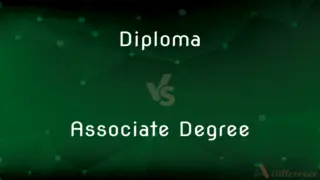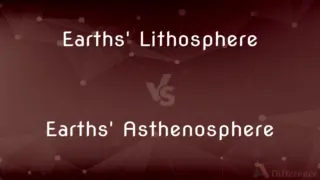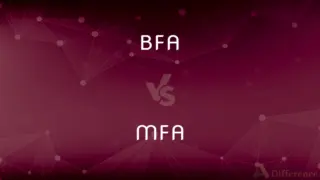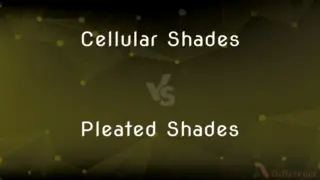Abstract vs. Surrealism — What's the Difference?
By Tayyaba Rehman & Maham Liaqat — Updated on March 16, 2024
Abstract art focuses on forms and colors independent of the real world, while Surrealism combines the bizarre and dreamlike.

Difference Between Abstract and Surrealism
Table of Contents
ADVERTISEMENT
Key Differences
Abstract art prioritizes form, color, and line to create compositions that may not represent reality directly, offering a visual language of shape and color. Surrealism, on the other hand, delves into the unconscious mind, presenting dream-like scenes and fantastic imagery that defy conventional logic.
While Abstract art moves away from depicting real-world subjects, allowing viewers to interpret its meaning personally, Surrealism often uses recognizable elements in unexpected contexts or combinations, aiming to unlock the subconscious.
Abstract works are characterized by their non-representational nature, often without a clear point of reference, which challenges viewers to engage with art on a purely visual or emotional level. Surrealism, while also challenging, seeks to explore ideas beyond the visible, tapping into themes of desire, fear, and the uncanny.
The origins of Abstract art can be traced back to the early 20th century, with artists like Wassily Kandinsky emphasizing the emotional power of color and form. Surrealism emerged slightly later, in the 1920s, with figures like Salvador Dalí and René Magritte, who created eerie, dream-like landscapes and scenes.
Abstract art can be seen as a more formal exploration of artistic elements, independent of external references. In contrast, Surrealism maintains a narrative or thematic link to reality, however distorted it may be, making it accessible on a different level.
ADVERTISEMENT
Comparison Chart
Focus
Form, color, and line
Dream-like scenes, subconscious
Representation
Non-representational
Distorted reality
Interpretation
Subjective, personal
Unlocks the subconscious
Elements
Shapes, colors
Recognizable elements, bizarre combinations
Historical Origin
Early 20th century
1920s
Compare with Definitions
Abstract
Art that uses shapes and colors in a non-representational way.
Kandinsky's compositions are pioneering works of abstract art.
Surrealism
Art that explores the unconscious mind through bizarre imagery.
Dalí's melting clocks are iconic examples of Surrealism.
Abstract
Emphasizes visual elements over realism.
Abstract artists prioritize line, color, and shape over depicting reality.
Surrealism
Aims to reveal deeper truths of the subconscious.
Surrealism seeks to explore desires and fears through symbolic imagery.
Abstract
Focuses on emotional or conceptual expression.
Abstract art often evokes emotions through color and form rather than detail.
Surrealism
Combines the familiar with the dream-like.
Surrealist works often feature ordinary objects in extraordinary contexts.
Abstract
Can be interpreted in multiple ways.
Each viewer may interpret an abstract piece differently based on personal experience.
Surrealism
Influenced by psychoanalytic theories.
Surrealist artists were inspired by Freud's theories on dreams and the unconscious.
Abstract
Does not depict objects realistically.
Abstract paintings may not resemble any recognizable forms from the real world.
Surrealism
Uses techniques like automatism to bypass rational thought.
Surrealists employed automatism to create art without conscious control.
Abstract
Considered apart from concrete existence
An abstract concept.
Surrealism
Surrealism was a cultural movement which developed in Europe in the aftermath of World War I and was largely influenced by Dada. The movement is best known for its visual artworks and writings and the juxtaposition of distant realities to activate the unconscious mind through the imagery.
Abstract
Not applied or practical; theoretical.
Surrealism
A literary and artistic movement of the 1900s that attempts to express the workings of the subconscious and is characterized by fantastic imagery and incongruous juxtaposition of subject matter.
Abstract
Difficult to understand; abstruse
Abstract philosophical problems.
Surrealism
Literature or art produced in this style.
Abstract
Denoting something that is immaterial, conceptual, or nonspecific, as an idea or quality
Abstract words like truth and justice.
Surrealism
An artistic movement and an aesthetic philosophy that aims for the liberation of the mind by emphasizing the critical and imaginative powers of the subconscious.
Abstract
Impersonal, as in attitude or views.
Surrealism
A 20th century movement of artists and writers (developing out of Dadaism) who used fantastic images and incongruous juxtapositions in order to represent unconscious thoughts and dreams
Abstract
Having an intellectual and affective artistic content that depends solely on intrinsic form rather than on narrative content or pictorial representation
Abstract painting and sculpture.
Abstract
A statement summarizing the important points of a text.
Abstract
Something abstract.
Abstract
An abstract of title.
Abstract
To take away; remove
Abstract the most important data from a set of records.
Abstract
To remove without permission; steal
A painting that was abstracted from the museum.
Abstract
To consider (an idea, for example) as separate from particular examples or objects
Abstract a principle of arrangement from a series of items.
Abstract
(ăbstrăkt′) To write a summary of; summarize
Abstract a long article in a paragraph.
Abstract
To create artistic abstractions of (something else, such as a concrete object or another style)
"The Bauhaus Functionalists were ... busy unornamenting and abstracting modern architecture, painting and design" (John Barth).
Abstract
An abridgement or summary of a longer publication.
Abstract
Something that concentrates in itself the qualities of a larger item, or multiple items.
Abstract
Concentrated essence of a product.
Abstract
(medicine) A powdered solid extract of a medicinal substance mixed with lactose.
Abstract
An abstraction; an abstract term; that which is abstract.
Abstract
The theoretical way of looking at things; something that exists only in idealized form.
Abstract
(arts) An abstract work of art.
Abstract
(real estate) A summary title of the key points detailing a tract of land, for ownership; abstract of title.
Abstract
(obsolete) Derived; extracted.
Abstract
Drawn away; removed from; apart from; separate.
Abstract
Not concrete: conceptual, ideal.
Her new film is an abstract piece, combining elements of magic realism, flashbacks, and animation but with very little in terms of plot construction.
Abstract
Insufficiently factual.
Abstract
Apart from practice or reality; vague; theoretical; impersonal; not applied.
Abstract
(grammar) As a noun, denoting a concept or intangible as opposed to an object, place, or person.
Abstract
Difficult to understand; abstruse; hard to conceptualize.
The politician gave a somewhat abstract answer when asked about their plans to cut spending.
Abstract
Separately expressing a property or attribute of an object that is considered to be inherent to that object: attributive, ascriptive.
Abstract
Pertaining comprehensively to, or representing, a class or group of objects, as opposed to any specific object; considered apart from any application to a particular object: general, generic, nonspecific; representational.
Abstract
(archaic) Absent-minded.
Abstract
(arts) Pertaining to the formal aspect of art, such as the lines, colors, shapes, and the relationships among them.
Abstract
Free from representational qualities, in particular the non-representational styles of the 20th century.
Abstract
(music) Absolute.
Abstract
(dance) Lacking a story.
Abstract
Being a partial basis for subclasses rather than a complete template for objects.
Abstract
(transitive) To separate; to disengage.
Abstract
(transitive) To remove; to take away; withdraw.
Abstract
To steal; to take away; to remove without permission.
Abstract
(transitive) To summarize; to abridge; to epitomize.
Abstract
To conceptualize an ideal subgroup by means of the generalization of an attribute, as follows: by apprehending an attribute inherent to one individual, then separating that attribute and contemplating it by itself, then conceiving of that attribute as a general quality, then despecifying that conceived quality with respect to several or many individuals, and by then ideating a group composed of those individuals perceived to possess said quality.
Abstract
To extract by means of distillation.
Abstract
(transitive) To consider abstractly; to contemplate separately or by itself; to consider theoretically; to look at as a general quality.
Abstract
To withdraw oneself; to retire.
Abstract
(transitive) To draw off (interest or attention).
He was wholly abstracted by other objects.
Abstract
To perform the process of abstraction.
Abstract
To create abstractions.
Abstract
To produce an abstraction, usually by refactoring existing code. Generally used with "out".
He abstracted out the square root function.
Abstract
Withdraw; separate.
The more abstract . . . we are from the body.
Abstract
Considered apart from any application to a particular object; separated from matter; existing in the mind only; as, abstract truth, abstract numbers. Hence: ideal; abstruse; difficult.
Abstract
Expressing a particular property of an object viewed apart from the other properties which constitute it; - opposed to concrete; as, honesty is an abstract word.
A concrete name is a name which stands for a thing; an abstract name which stands for an attribute of a thing. A practice has grown up in more modern times, which, if not introduced by Locke, has gained currency from his example, of applying the expression "abstract name" to all names which are the result of abstraction and generalization, and consequently to all general names, instead of confining it to the names of attributes.
Abstract
Abstracted; absent in mind.
Abstract
To withdraw; to separate; to take away.
He was incapable of forming any opinion or resolution abstracted from his own prejudices.
Abstract
To draw off in respect to interest or attention; as, his was wholly abstracted by other objects.
The young stranger had been abstracted and silent.
Abstract
To separate, as ideas, by the operation of the mind; to consider by itself; to contemplate separately, as a quality or attribute.
Abstract
To epitomize; to abridge.
Abstract
To take secretly or dishonestly; to purloin; as, to abstract goods from a parcel, or money from a till.
Von Rosen had quietly abstracted the bearing-reins from the harness.
Abstract
To separate, as the more volatile or soluble parts of a substance, by distillation or other chemical processes. In this sense extract is now more generally used.
Abstract
To perform the process of abstraction.
I own myself able to abstract in one sense.
Abstract
That which comprises or concentrates in itself the essential qualities of a larger thing or of several things. Specifically: A summary or an epitome, as of a treatise or book, or of a statement; a brief.
An abstract of every treatise he had read.
Man, the abstractOf all perfection, which the workmanshipOf Heaven hath modeled.
Abstract
A state of separation from other things; as, to consider a subject in the abstract, or apart from other associated things.
Abstract
An abstract term.
The concretes "father" and "son" have, or might have, the abstracts "paternity" and "filiety."
Abstract
A powdered solid extract of a vegetable substance mixed with sugar of milk in such proportion that one part of the abstract represents two parts of the original substance.
Abstract
A concept or idea not associated with any specific instance;
He loved her only in the abstract--not in person
Abstract
A sketchy summary of the main points of an argument or theory
Abstract
Consider a concept without thinking of a specific example; consider abstractly or theoretically
Abstract
Make off with belongings of others
Abstract
Consider apart from a particular case or instance;
Let's abstract away from this particular example
Abstract
Give an abstract (of)
Abstract
Existing only in the mind; separated from embodiment;
Abstract words like `truth' and `justice'
Abstract
Not representing or imitating external reality or the objects of nature;
A large abstract painting
Abstract
Based on specialized theory;
A theoretical analysis
Abstract
Dealing with a subject in the abstract without practical purpose or intention;
Abstract reasoning
Abstract science
Common Curiosities
Can abstract art and Surrealism overlap?
While their core philosophies differ, both movements can intersect in the use of abstract elements to convey surreal experiences.
How do abstract art and Surrealism differ in their approach to reality?
Abstract art eschews direct representation of reality, focusing on emotional or conceptual expression, whereas Surrealism distorts reality to explore the unconscious mind.
What defines abstract art?
Abstract art uses colors, forms, and lines to create compositions independent of real-world visual references.
How do viewers typically interact with abstract art?
Viewers of abstract art are encouraged to engage with the work on a personal level, interpreting its meaning based on individual perception and emotion.
How did abstract art develop?
Abstract art emerged as artists sought to move away from traditional representation, focusing instead on the intrinsic qualities of painting and sculpture.
Why is Surrealism often considered more accessible than abstract art?
Because Surrealism incorporates recognizable elements in unexpected ways, it can be more immediately engaging to viewers through its narrative or thematic content.
What impact did Freudian psychoanalysis have on Surrealism?
Freudian psychoanalysis profoundly influenced Surrealism, inspiring artists to explore dream imagery and the unconscious as sources of creativity.
What techniques are unique to Surrealism?
Surrealism is known for techniques like automatism and the use of symbolic imagery to express the workings of the unconscious mind.
What is Surrealism?
Surrealism is an artistic movement that seeks to express the unconscious mind through dream-like imagery and bizarre combinations.
How has abstract art influenced contemporary art?
Abstract art has laid the groundwork for various contemporary art movements, emphasizing the importance of color, form, and non-representational approaches.
How do artists create Surrealist works?
Surrealist artists often employ techniques like automatism or draw inspiration from dreams to create art that bypasses traditional rational processes.
What themes are common in Surrealist art?
Themes in Surrealist art often include desire, fantasy, the uncanny, and explorations of the human psyche.
Is it possible for art to be both abstract and Surrealist?
Yes, some artworks and artists may blend elements of both movements, creating pieces that are abstract in form but surreal in content or theme.
Can Surrealism be found in media other than visual art?
Yes, Surrealism has influenced literature, film, and theater, where it manifests in surreal narratives and imagery.
What role does emotion play in abstract art?
Emotion in abstract art is often conveyed through the use of color, form, and composition, allowing artists to express feelings without figurative representation.
Share Your Discovery

Previous Comparison
Scholarship vs. Freeship
Next Comparison
Satin vs. SateenAuthor Spotlight
Written by
Tayyaba RehmanTayyaba Rehman is a distinguished writer, currently serving as a primary contributor to askdifference.com. As a researcher in semantics and etymology, Tayyaba's passion for the complexity of languages and their distinctions has found a perfect home on the platform. Tayyaba delves into the intricacies of language, distinguishing between commonly confused words and phrases, thereby providing clarity for readers worldwide.
Co-written by
Maham Liaqat














































